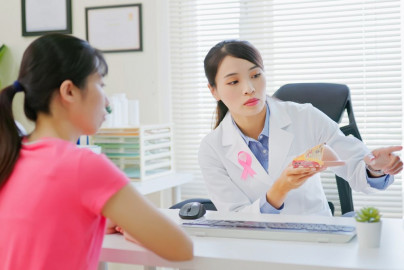Blog

Understanding Breast Cancer Risk Assessment Scores
On March 13, 2024, actress Olivia Munn announced that she had been diagnosed with breast cancer. Two months before the diagnosis, she had taken a genetic test and received a mammogram, both of which came back negative for breast cancer. How then was she diagnosed?
At a routine OBG-YN visit, Munn’s provider decided to calculate Munn’s Breast Cancer Risk Assessment Score, given the actress’s familial breast cancer history, and recent pregnancy at age 30. Munn was found to have a 37% risk of developing cancer in her lifetime, which prompted an MRI, an ultrasound, and eventually, a biopsy that revealed she had Luminal B cancer in both breasts. This cancer is fast-moving and aggressive, and would have gone unnoticed for another year (until Munn’s next mammogram), had her doctor never calculated her risk.
Luckily, by catching the cancer early, Munn was able to have both her breasts removed and is now recovering cancer-free. Munn’s harrowing story naturally begs the question: What is the Breast Cancer Risk Assessment Score and who should be getting it?
What is a Breast Cancer Risk Assessment Score?
Although an important practice in breast cancer prevention, mammograms can produce false negatives, particularly for those with dense/fatty breast tissue. Luckily, as in Munn’s case, tools such as the Breast Cancer Risk Assessment Score can help assess whether more advanced imaging, such as an MRI, is needed. According to Munn’s doctor, those with a 20% or higher risk of developing breast cancer in their lifetime, should receive annual mammograms and breast MRIs.
There are a handful of different models of the Breast Cancer Risk Assessment Score, with the most popular being the Gail Model and the Ibis Model, the latter of which is known to be more detailed. It is important to remember that a Breast Cancer Risk Assessment Score is not meant to predict whether or not you will get cancer, but rather indicate whether or not you have a higher chance of doing so, when compared to data of those with similar factors. It is also important to note that these tools often underestimate risk in women of color, given the lack of data on women of different ethnicities. Therefore, it is important to consult your doctor on an assessment that is right for you.
What to Expect
The Breast Cancer Risk Assessment Score is a detailed questionnaire that asks in-depth questions about your reproductive health, family history, and more. The assessment considers both genetic and non-genetic factors. Questions examples may include:
- At what age did you get your period?
- How old were you when you had your first child?
- How many of your immediate family members have breast cancer?
Although these assessments can be taken by yourself, they are designed for providers and therefore the results can be difficult to analyze on your own. If you are concerned about your risk of cancer, ask your provider to conduct a Breast Cancer Risk Assessment and help you understand your score.
Who Should Receive a Breast Cancer Risk Assessment Score
Given its relative ease, it is reasonable for all adult women to assess their risk of breast cancer, especially for those with a family history of breast cancer. Other groups of women who may want to be more inclined to calculate their risk may include:
- Women with dense breast tissue
- Women with breast abnormalities
- Women with obesity
- Women who smoke and/or engage in increased alcohol consumption
It is important to note that your risk will change with age, so it is important to get reassessed as often as your provider deems fit.
Speaking to Your Provider
Breast cancer risk assessment scores are powerful tools in the fight against breast cancer, empowering women to take charge of their health and well-being. By understanding your risk profile, you and your provider can take proactive steps to protect your breast health. Routine risk assessment scores can lead to earlier detection, intervention, and potentially life-saving outcomes. Remember, knowledge is power, and by arming ourselves with information, we can strive towards a future where breast cancer is detected early or possibly prevented altogether. If you would like to learn more about your risk of developing breast cancer, speak to a provider today.
Back to blog